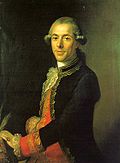
Tomás de Iriarte y Oropesa
Encyclopedia

Puerto de la Cruz
Puerto de la Cruz is a city and municipality located in Spain, on the north coast of Tenerife island, in the Orotava Valley...
, La Orotava, island of Tenerife
Tenerife
Tenerife is the largest and most populous island of the seven Canary Islands, it is also the most populated island of Spain, with a land area of 2,034.38 km² and 906,854 inhabitants, 43% of the total population of the Canary Islands. About five million tourists visit Tenerife each year, the...
, 18 September 1750 Madrid
Madrid
Madrid is the capital and largest city of Spain. The population of the city is roughly 3.3 million and the entire population of the Madrid metropolitan area is calculated to be 6.271 million. It is the third largest city in the European Union, after London and Berlin, and its metropolitan...
, 17 September 1791), was a Spanish
Spain
Spain , officially the Kingdom of Spain languages]] under the European Charter for Regional or Minority Languages. In each of these, Spain's official name is as follows:;;;;;;), is a country and member state of the European Union located in southwestern Europe on the Iberian Peninsula...
neoclassical
Spanish Enlightenment literature
Spanish Enlightenment literature is the literature of Spain written during the Age of Enlightenment.During the 18th century a new spirit was born which swept away the older values of the Baroque and which receives the name of "Enlightenment"...
poet
Poet
A poet is a person who writes poetry. A poet's work can be literal, meaning that his work is derived from a specific event, or metaphorical, meaning that his work can take on many meanings and forms. Poets have existed since antiquity, in nearly all languages, and have produced works that vary...
.
Life
Tomás was born to the Iriarte family, many of whose members were writers in the humanistHumanism
Humanism is an approach in study, philosophy, world view or practice that focuses on human values and concerns. In philosophy and social science, humanism is a perspective which affirms some notion of human nature, and is contrasted with anti-humanism....
tradition. His father was Don Bernardo de Iriarte, (1735 Puerto dela Cruz - Bordeaux, France, in exile, 1814) while his mother was Doña Bárbara de las Nieves Hernández de Oropesa.
He received his literary education at Madrid
Madrid
Madrid is the capital and largest city of Spain. The population of the city is roughly 3.3 million and the entire population of the Madrid metropolitan area is calculated to be 6.271 million. It is the third largest city in the European Union, after London and Berlin, and its metropolitan...
where he went aged 14 in 1764 under the care of his uncle, Juan de Iriarte
Juan de Iriarte
Juan de Iriarte was a Spanish writer, French and English translator in the Royal Chancillery, Hellenist and latinist.-Biography:...
, (Puerto de la Cruz, 1701 - Madrid 1771), librarian to the king of Spain. In his eighteenth year the nephew began his literary career by translating French plays for the royal theatre, and in 1770, under the anagram
Anagram
An anagram is a type of word play, the result of rearranging the letters of a word or phrase to produce a new word or phrase, using all the original letters exactly once; e.g., orchestra = carthorse, A decimal point = I'm a dot in place, Tom Marvolo Riddle = I am Lord Voldemort. Someone who...
of Tirso Imarete, he published an original comedy entitled Hacer que hacemos.
In the following year he became official translator at the foreign office, and in 1776 keeper of the records in the war department. In 1780 he authored a didactic poem in cilvas entitled La Música, which attracted some attention in Italy as well as at home.
The Fábulas literarias (1782), with which his name is most intimately associated, are composed in a great variety of metres, and was known for humorous attacks on literary men and methods, as was the case, again and again, with Juan Pablo Forner , (1756–1797).
During his later years, partly in consequence of the Fábulas, Iriarte was absorbed in personal controversies, and in 1786 was reported to the Inquisition
Spanish Inquisition
The Tribunal of the Holy Office of the Inquisition , commonly known as the Spanish Inquisition , was a tribunal established in 1480 by Catholic Monarchs Ferdinand II of Aragon and Isabella I of Castile. It was intended to maintain Catholic orthodoxy in their kingdoms, and to replace the Medieval...
for his sympathies with the French philosophers.
He died of gout
Gout
Gout is a medical condition usually characterized by recurrent attacks of acute inflammatory arthritis—a red, tender, hot, swollen joint. The metatarsal-phalangeal joint at the base of the big toe is the most commonly affected . However, it may also present as tophi, kidney stones, or urate...
at Madrid
Madrid
Madrid is the capital and largest city of Spain. The population of the city is roughly 3.3 million and the entire population of the Madrid metropolitan area is calculated to be 6.271 million. It is the third largest city in the European Union, after London and Berlin, and its metropolitan...
, 17 September 1791, aged only 41.
He is the subject of an exhaustive monograph (1897) by Emilio Cotarelo y Mori, (Vegadeo, 1 May 1857 – Madrid, 27 January 1936), member of the Royal Spanish Academy, just that year.
External links
- Fábulas Literarias Fábulas Literarias complete (Spanish)

